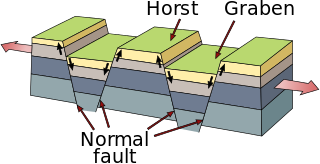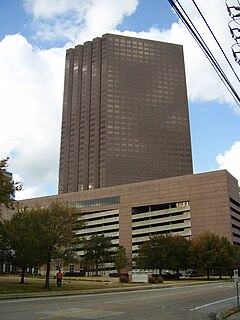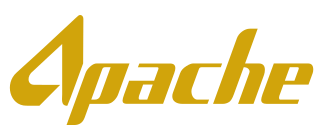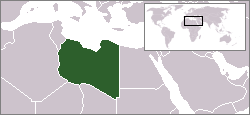
The economy of Libya depends primarily on revenues from the petroleum sector, which represents over 95% of export earnings and 60% of GDP. These oil revenues and a small population have given Libya one of the highest nominal per capita GDP in Africa.

In physical geography and geology, a horst is a raised fault block bounded by normal faults. A horst is a raised block of the Earth's crust that has lifted, or has remained stationary, while the land on either side (graben) has subsided. The word Horst in Dutch and German means heap – cognate with English "hurst".

Marathon Oil Corporation is an American company engaged in hydrocarbon exploration incorporated in Ohio and headquartered in the Marathon Oil Tower in Houston, Texas.

Sonatrach is the national state-owned oil company of Algeria. Founded in 1963, it is known today to be the largest company in Africa with 154 subsidiaries, and often referred as the first African oil "major".
Air Libya is a privately owned charter airline based in Benghazi, Libya. It was established in 1996 as Tibesti Air Libya, and was initially based in Tripoli. The company now operates charter flights in support of oil field operations, as well as providing some scheduled and "ad hoc" charter services. Its main base is at Benina International Airport in Benghazi.

The Heidrun oil field is an oil and gas field discovered in 1985 in the Norwegian sector of the Norwegian Sea, named after the goat Heiðrún from Norse mythology.

APA Corporation is the holding company for Apache Corporation, an American company engaged in hydrocarbon exploration. It is organized in Delaware and headquartered in Houston. The company is ranked 595th on the Fortune 500.
For further details see the "Energy crisis" series by Facts on File.
The Iraq National Oil Company (INOC) was founded in 1966 by the Iraqi government. It was empowered to operate all aspects of the oil industry in Iraq except for refining which was already being run by the Oil Refineries Administration (1952) and local distribution which was also already under government control.
The National Oil Corporation is the national oil company of Libya. It dominates Libya's oil industry, along with a number of smaller subsidiaries, which combined account for around 70% the country's oil output. Of NOC's subsidiaries, the largest oil producer is the Waha Oil Company (WOC), followed by the Arabian Gulf Oil Company (Agoco), Zueitina Oil Company (ZOC), and Sirte Oil Company (SOC).
Waha Oil Company is an oil company based in Tripoli, Libya, engaged in the fields of crude oil and natural gas exploration and production.

Waha field is an oil field located in the Libya sirte basin and owned by the Waha Oil Company (WOC), which is a subsidiary of the National Oil Corporation (NOC). During 2006, the Waha fields produced around 350,000 barrels (56,000 m3) per day, down from around 1 Mbbl/d (160,000 m3/d) in 1969 and 400,000 bbl/d (64,000 m3/d) in 1986. However, WOC expects to increase Waha output by around 200,000 bbl/d (32,000 m3/d) over the next couple of years. In 2005, ConocoPhillips and co-venturers reached an agreement with NOC to both return to its operations in Libya and to extend the Waha concession by another 25 years. ConocoPhillips operates the Waha fields with a 16.33% share in the project. NOC has the largest share of the Waha concession at 59.17%, and additional partners include Marathon Oil (16.33%), and Amerada Hess (8.17%). The Waha oil field was captured by ISIS soldiers on March 5th 2015 but has since been recaptured.

The Arabian Gulf Oil Company is an oil company based in Benghazi, Libya, engaged in crude oil and natural gas exploration, production and refining. It was a subsidiary of the state-owned National Oil Corporation (NOC).

Sirte Oil Company (SOC) is an oil and gas company in Libya operating under the state-owned National Oil Corporation (NOC). The company is located in Brega SOC’s operations include oil and gas exploration and production (E&P) and manufacturing.

The Zelten oil field is located at the foot of the Zelten Mountains, about 169 kilometres (105 mi) south of Brega in Concession 6. Zelten holds the title as the largest oil field in the Gulf of Sidra. The 229 wells in Zelten use a gas lifting system. The Zelten oil field is not associated with the town Zelten, which is located in the North-West of Libya.
The Elephant Field is an oil field located in onshore in Libya's Murzuq Basin.

The Raguba field is an oil field located in the central part of Libya's Sirte Basin in Concession 20. The Sirte Oil Company (SOC) operates the Raguba field. The field is connected by pipeline to the main line between the Nasser field, one of the largest in Libya, and Brega. Raguba field has 80 wells producing high gravity (43 °API) oil. The first exploration oil well in this field was drilled in January 1961 with production commencing in 1963. By the end of 2005, the field had produced 787 million standard barrels of oil and 859×10^9 cu ft (2.43×1010 m3) of associated gas.

The Sirte Basin is a late Mesozoic and Cenozoic triple junction continental rift along northern Africa that was initiated during the late Jurassic Period. It borders a relatively stable Paleozoic craton and cratonic sag basins along its southern margins. The province extends offshore into the Mediterranean Sea, with the northern boundary drawn at the 2,000 meter (m) bathymetric contour. It borders in the north on the Gulf of Sidra and extends south into northern Chad.

The Sarir Field was discovered in southern Cyrenaica during 1961 and is considered to be the largest oil field in Libya, with estimated oil reserves of 12 Gbbl (1.9 km3). Sarir is operated by the Arabian Gulf Oil Company (AGOCO), a subsidiary of the state-owned National Oil Corporation (NOC).
Libya's Petroleum Law No. 25 of 1955 was the law of Libya which authorised the allocation of land to individual oil prospectors, and the drilling of oil wells. It followed the Minerals Law of 1953, which established a system for obtaining permits to survey for petroleum. Despite the multiple changes of government and legal framework since its enactment, As of 2007 it remained in effect. It does not contain any provisions for natural gas drilling. In the 2000s, the Libyan government began work on drafting a new petroleum law.











